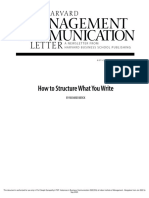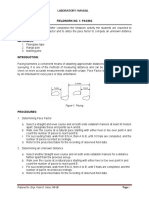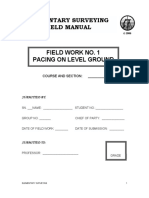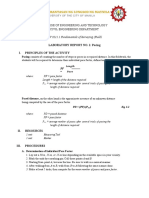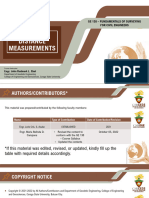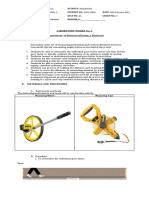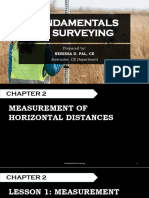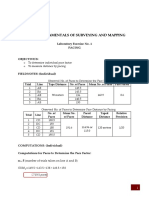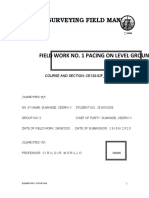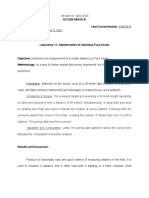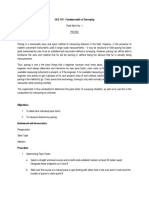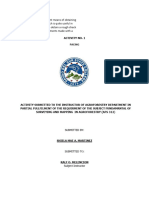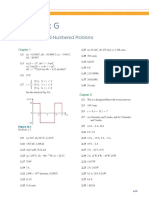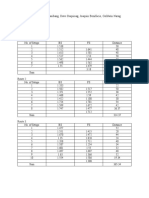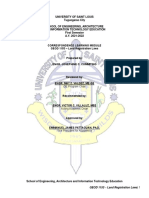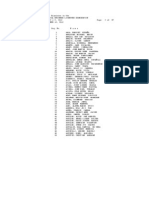Lab 1 Pacing
Lab 1 Pacing
Uploaded by
Joaquin Miguel BonifacioCopyright:
Available Formats
Lab 1 Pacing
Lab 1 Pacing
Uploaded by
Joaquin Miguel BonifacioOriginal Title
Copyright
Available Formats
Share this document
Did you find this document useful?
Is this content inappropriate?
Copyright:
Available Formats
Lab 1 Pacing
Lab 1 Pacing
Uploaded by
Joaquin Miguel BonifacioCopyright:
Available Formats
LABORATORY MANUAL
IN SURVEYING 1
FIELDWORK NO. 1: PACING
LEARNING OUTCOMES: After completion the fieldwork activity the students are expected to
determine individual pace factor and to utilize the pace factor to compute an unknown distance
by pacing.
MATERIALS:
1. Fiberglass tape
2. Range pole
3. Marking pins
INTRODUCTION:
Pacing furnishes a convenient means of obtaining approximate distances which is quite useful in
surveying. It is one of the methods of measuring distances and can be used to obtain a rough
check on more accurate measurements made with a tape. Pace Factor is the distance traversed
by an individual for every pace or step undertaken.
Figure 1. Pacing
PROCEDURES:
1. Determining Pace Factor
a. Select a straight and level course and on both ends establish markers at least 50 meters
apart. Designate these end points as A and B.
b. Walk over the course at a natural pace starting with either heel or toe over point A and
count the number of paces to reach point B.
c. For succeeding trials, walk from B to A, then A to B, until 10 trials are completed, and the
number of paces recorded accordingly.
d. Refer to the prescribed table for the recording of observed field data.
2. Determining an Unknown Distance
a. Your instructor establishes another straight level course for you to determine the
distance.
b. Walk over the course at a natural pace starting with either heel or toe over point A and
count the number of paces to reach point B.
c. For succeeding trials, walk from B to A, then A to B, until 5 trials are completed, and the
number of paces recorded accordingly.
d. Refer to the prescribed table for the recording of observed field data.
Prepared by: Engr. Valdez Page 1
LABORATORY MANUAL
IN SURVEYING 1
Figure 2. Course to be Paced
DATA AND COMPUTATION:
1. Pace Factor
Trials No. of Paces Trials No. of Paces
1 6
2 7
3 8
4 9
5 10
measured distance = _____50m_______
total no . of paces=∑ of all paces ∈10 trials
total no . of paces
average no . of paces=
total no . of trials
measured distance
Pace Factor=
average no . of paces
Prepared by: Engr. Valdez Page 2
LABORATORY MANUAL
IN SURVEYING 1
Prepared by: Engr. Valdez Page 3
LABORATORY MANUAL
IN SURVEYING 1
2. Unknown Distance
Trials No. of Paces
1
2
3
4
5
measured distance = 57.90m
total no . of paces=∑ of all paces ∈5 trials
total no . of paces
average no . of paces=
total no . of trials
Unknown Distance=(average no . of paces )( Pace Factor)
% error=¿ unknown distance−measured distance∨ ¿ (100 % )¿
measured distance
LABORATORY MANUAL
IN SURVEYING 1
OBSERVATIONS:
CONCLUSION:
You might also like
- Surveying - Lab Report 1Document9 pagesSurveying - Lab Report 1Jhett100% (1)
- How To Structure What You Write C9812B-PDF-ENGDocument4 pagesHow To Structure What You Write C9812B-PDF-ENGHarshav BessariyaNo ratings yet
- Quantum Physics and Nosodes SarcodesDocument14 pagesQuantum Physics and Nosodes SarcodesA.Antoni100% (1)
- Laboratory Manual in Surveying 1 Fieldwork No. 1: Pacing LEARNING OUTCOMES: After Completion The Fieldwork Activity The Students Are Expected ToDocument5 pagesLaboratory Manual in Surveying 1 Fieldwork No. 1: Pacing LEARNING OUTCOMES: After Completion The Fieldwork Activity The Students Are Expected ToViktor Mikhael Roch BarbaNo ratings yet
- (LAB) Field Exercise #1 - PacingDocument3 pages(LAB) Field Exercise #1 - PacingAdame, Shira Marie - BerondoNo ratings yet
- Lab Module 1Document8 pagesLab Module 1Billy Joe GodoyNo ratings yet
- Surveying Field Manual 2Document94 pagesSurveying Field Manual 2mark galangNo ratings yet
- Ge 100 - General Surveying I: o To Determine Individual Pace Factor o To Measure Distance by PacingDocument2 pagesGe 100 - General Surveying I: o To Determine Individual Pace Factor o To Measure Distance by PacingjulietNo ratings yet
- Field Work No. 1 - Pacing On Level GroundDocument8 pagesField Work No. 1 - Pacing On Level GroundMae Ann SacayNo ratings yet
- Lab 1Document4 pagesLab 1Michael Angelo MontebonNo ratings yet
- Field Work No. 1 Pacing in Level Ground: Mapúa Institute of TechnologyDocument10 pagesField Work No. 1 Pacing in Level Ground: Mapúa Institute of TechnologyMerlin Dionisio75% (4)
- Exercise 1Document5 pagesExercise 1Ibale, Arjay D.No ratings yet
- Survey Lab 01 PacingDocument2 pagesSurvey Lab 01 PacingCristine CatedrillaNo ratings yet
- College of Engineering and Technology Civil Engineering DepartmentDocument7 pagesCollege of Engineering and Technology Civil Engineering DepartmentFroiland IgnacioNo ratings yet
- GE 138 Topic 4Document134 pagesGE 138 Topic 4rbqbjf5wx9No ratings yet
- Surveying Lab Exercise 1Document5 pagesSurveying Lab Exercise 1Lawrence TuliaoNo ratings yet
- Group 5 - Fieldwork 1 - B06Document6 pagesGroup 5 - Fieldwork 1 - B06Prince KJNo ratings yet
- Problem: Pacing: Lab Exercise No.1Document7 pagesProblem: Pacing: Lab Exercise No.1HanenAlmoeteNo ratings yet
- Evangelista Lab 2.Document5 pagesEvangelista Lab 2.Stephen EvangelistaNo ratings yet
- Field Work No. 1 - Pacing On Level GroundDocument8 pagesField Work No. 1 - Pacing On Level GroundMNo ratings yet
- Fos PT1Document9 pagesFos PT1JericoNo ratings yet
- Performance Task 1Document8 pagesPerformance Task 1JericoNo ratings yet
- Inbound 8522421804784509497Document46 pagesInbound 8522421804784509497Sultan MejiaNo ratings yet
- Survey Lab - 01 (Pacing)Document2 pagesSurvey Lab - 01 (Pacing)Ian ChrisNo ratings yet
- Engr. Mark Ondac/Engr. Ivan Karl CamachoDocument10 pagesEngr. Mark Ondac/Engr. Ivan Karl CamachoJohn Carlo TeodonesNo ratings yet
- Esci 121 - Fundamentals of SurveyingDocument7 pagesEsci 121 - Fundamentals of Surveyinghen henNo ratings yet
- CE211F-18 FW#1 Pacing - 2CE-3Document9 pagesCE211F-18 FW#1 Pacing - 2CE-3Bea BachillerNo ratings yet
- Ce 2121L Fieldwork No. 2Document4 pagesCe 2121L Fieldwork No. 2ria jean camangianNo ratings yet
- Laboratory Exercise No. 1 PACINGDocument5 pagesLaboratory Exercise No. 1 PACINGmechaellaNo ratings yet
- Field Work No.1 Pacing On Level Ground: Elementary Surveying Field ManualDocument22 pagesField Work No.1 Pacing On Level Ground: Elementary Surveying Field ManualAllyssa Jane B. OrejudosNo ratings yet
- EHSURVL Lab Exercise 1Document5 pagesEHSURVL Lab Exercise 1Marvin Bryant MedinaNo ratings yet
- Field Work No.1 Pacing On Level Ground: Elementary Surveying Field ManualDocument14 pagesField Work No.1 Pacing On Level Ground: Elementary Surveying Field ManualJune LantaconNo ratings yet
- CE211 Field Work No. 1Document4 pagesCE211 Field Work No. 1Nodado Rest Gabrielle P.No ratings yet
- Lab 1 PacingDocument3 pagesLab 1 PacingRainiel MontalbaNo ratings yet
- PacingDocument6 pagesPacingNia MochiNo ratings yet
- FW No. 2Document3 pagesFW No. 2Chris TianNo ratings yet
- University of Cebu (UC) : College of Engineering (COE)Document2 pagesUniversity of Cebu (UC) : College of Engineering (COE)florie janeNo ratings yet
- ACTIVITY-1 SurveyingGROUP5Document3 pagesACTIVITY-1 SurveyingGROUP5verylmalazaNo ratings yet
- Field Work # 1 - Pacing On Level GroundDocument6 pagesField Work # 1 - Pacing On Level GroundPeterjohn QuimingNo ratings yet
- Lec 6Document34 pagesLec 6crisvincentriveraudang15No ratings yet
- Labreport 01 Group 19Document9 pagesLabreport 01 Group 19John Carlo TeodonesNo ratings yet
- Sumande - Field Work No.1 - Pacing On Level GroundDocument12 pagesSumande - Field Work No.1 - Pacing On Level GroundCedrix Sumande100% (1)
- Activity 1 PacingDocument3 pagesActivity 1 PacingPrincess JeannyNo ratings yet
- 02 - Worksheet - Measure A DistanceDocument1 page02 - Worksheet - Measure A DistanceNavin Raj Kumar -No ratings yet
- Elementary Surveying Field Manual: Field Work No.1 Pacing On Level GroundDocument7 pagesElementary Surveying Field Manual: Field Work No.1 Pacing On Level GroundJericho MaganaNo ratings yet
- Ce120-0f Field Work 1Document14 pagesCe120-0f Field Work 1Calvin Paulo MondejarNo ratings yet
- Pampanga State Agricultural UniversityDocument4 pagesPampanga State Agricultural UniversityIan MarquezNo ratings yet
- Plane Surveying PacingDocument7 pagesPlane Surveying PacingRegine Gail San JoseNo ratings yet
- Fieldwork No.1 Distance Determination by PacingDocument6 pagesFieldwork No.1 Distance Determination by PacingAce JokerNo ratings yet
- 1 Pacing On Level GroundDocument8 pages1 Pacing On Level GroundGheraldine Cortez50% (2)
- Pacing Exercise: General Physics 1 - Final LaboratoryDocument3 pagesPacing Exercise: General Physics 1 - Final LaboratoryJosh PapaNo ratings yet
- Surveying Lab 1Document4 pagesSurveying Lab 1Myles QuinteroNo ratings yet
- Laboratory #1 - Dertermination of Individual's Pace FactorDocument3 pagesLaboratory #1 - Dertermination of Individual's Pace FactorBLESSA TORRESNo ratings yet
- FRM 041 First Activity01Document10 pagesFRM 041 First Activity01Juhairah MamarungcasNo ratings yet
- Fielwork 1 (Group 5 Ce-2c)Document8 pagesFielwork 1 (Group 5 Ce-2c)Andrea L.No ratings yet
- Field Work No.1. (Pacing)Document3 pagesField Work No.1. (Pacing)JAY-AR DISOMIMBANo ratings yet
- Fundamentals of Surveying Laboratory (Ce03L)Document4 pagesFundamentals of Surveying Laboratory (Ce03L)Danica Lou BernalNo ratings yet
- Acivity # 1 PacingDocument4 pagesAcivity # 1 PacingShiela Mae MartinezNo ratings yet
- Quiz02 Gensurvb91 BONIFACIODocument2 pagesQuiz02 Gensurvb91 BONIFACIOJoaquin Miguel BonifacioNo ratings yet
- Appendix G: Answers To Odd-Numbered ProblemsDocument8 pagesAppendix G: Answers To Odd-Numbered ProblemsJoaquin Miguel BonifacioNo ratings yet
- Write UpDocument3 pagesWrite UpJoaquin Miguel BonifacioNo ratings yet
- WEEK 3-4 LmsDocument9 pagesWEEK 3-4 LmsJoaquin Miguel BonifacioNo ratings yet
- WEEK 3 4 Land - Registration - LawsDocument7 pagesWEEK 3 4 Land - Registration - LawsJoaquin Miguel BonifacioNo ratings yet
- Use Cases For ATM SystemDocument10 pagesUse Cases For ATM SystemNitin PatelNo ratings yet
- Social Sciences and HistoryDocument8 pagesSocial Sciences and HistoryChidinma Glory EjikeNo ratings yet
- India CSR ReportDocument197 pagesIndia CSR ReportSanjeev Kumar100% (1)
- Analytical NTSDocument13 pagesAnalytical NTSShoaib AhmedNo ratings yet
- Julia Volkman Spelling in Preschool Children PDFDocument37 pagesJulia Volkman Spelling in Preschool Children PDFDonna Karen Calzada ChanNo ratings yet
- Documents: Convert Powerpoint Files in PDF! W/ The Free PDF Converter For PCDocument15 pagesDocuments: Convert Powerpoint Files in PDF! W/ The Free PDF Converter For PCpetreNo ratings yet
- Week 8Document3 pagesWeek 8Madeline ButterworthNo ratings yet
- Data SufficiencyDocument10 pagesData Sufficiencylokeshreddy kavalakuntlaNo ratings yet
- AMU - List of M.Tech. / B.Tech. Computer / Electronics & MCA 2022 BatchDocument6 pagesAMU - List of M.Tech. / B.Tech. Computer / Electronics & MCA 2022 BatchManish SharmaNo ratings yet
- Form 2, Chap 04: Interdependence Among Living Organisms and The EnvironmentDocument8 pagesForm 2, Chap 04: Interdependence Among Living Organisms and The EnvironmentSyahrulNo ratings yet
- Lecture 01Document22 pagesLecture 01ayuya_hyugaNo ratings yet
- Activities Using Rope and String Risk AssessmentDocument3 pagesActivities Using Rope and String Risk Assessmentjinaga rajeshNo ratings yet
- Supplier Audit ChecklistDocument12 pagesSupplier Audit ChecklistRildo Alves0% (1)
- Sap Ehp1 For Sap CRM 7.0: Learning Map For Partner Channel Management ConsultantsDocument8 pagesSap Ehp1 For Sap CRM 7.0: Learning Map For Partner Channel Management ConsultantskalyansapcrmNo ratings yet
- November 2017Document64 pagesNovember 2017Treatment Plant Operator MagazineNo ratings yet
- C Notes enDocument68 pagesC Notes ensavio77No ratings yet
- Audit SampleDocument45 pagesAudit SampleMohd AmaniNo ratings yet
- Catalogo SiwarexDocument85 pagesCatalogo Siwarex3852692No ratings yet
- Review On Two Stage Evaporative Cooler: Dr. U.V.Kongre, N.T.Neware, P.A.Bagade, N.P.IngaleDocument3 pagesReview On Two Stage Evaporative Cooler: Dr. U.V.Kongre, N.T.Neware, P.A.Bagade, N.P.IngaleerpublicationNo ratings yet
- Persistence of Visions (Lessons in Living From The Classroom and Elsewhere)Document679 pagesPersistence of Visions (Lessons in Living From The Classroom and Elsewhere)Nelson R. "Buzz" KelloggNo ratings yet
- REE0912 SeDocument46 pagesREE0912 Sema_pascual_8No ratings yet
- A2 Film Studies Coursework ScreenplayDocument6 pagesA2 Film Studies Coursework Screenplayqrsirljbf100% (2)
- Detailed Lesson Plan 2Document6 pagesDetailed Lesson Plan 2Merry Joy Necio BongatoNo ratings yet
- Revision Unit 3 - L&S - Attempt ReviewDocument5 pagesRevision Unit 3 - L&S - Attempt ReviewТУУЛ Бат-ЭрдэнэNo ratings yet
- How To Password Protect A Folder in Windows 10Document20 pagesHow To Password Protect A Folder in Windows 10Hatem ShawkiNo ratings yet
- Methods and Settings For Sensitivity AnalysisDocument24 pagesMethods and Settings For Sensitivity AnalysisSebastian Herrera RamosNo ratings yet
- Flower PowerDocument4 pagesFlower Poweramishcar100% (2)
- Jurnal Beels PalsyDocument5 pagesJurnal Beels PalsyVikborn TjgNo ratings yet

